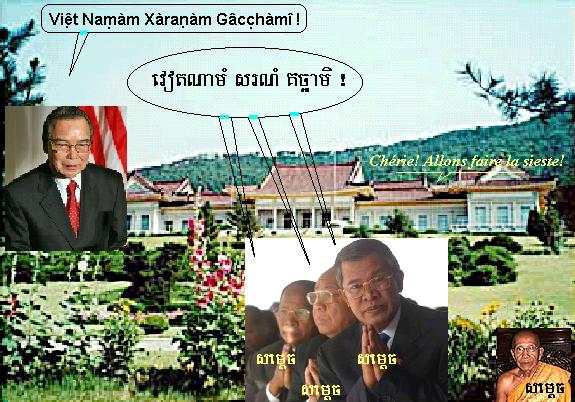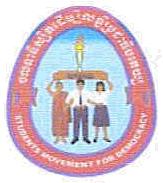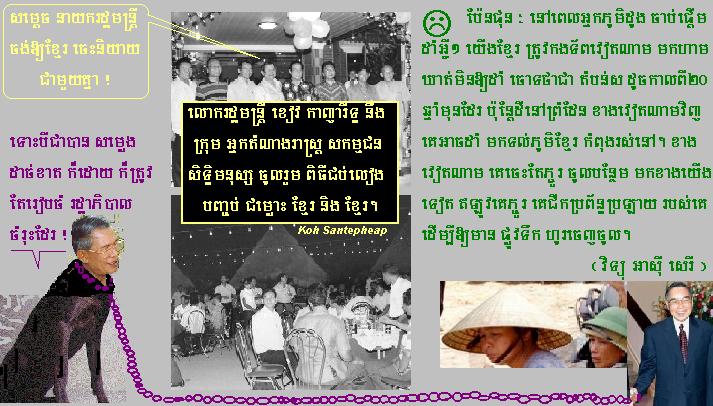Les bonzes cambodgiens n'ont jamais été aussi nombreux !

| RENCONTRER DIEU |
camboDIATRIBE | MEET WITH GOD |
Swift answer to banking across Vietnam border (2006-Mar-25)
By Kate Evans , Phnom Penh Post : Trade between Cambodia and
Vietnam was given a boost this week, as banks from both countries signed
an agreement enabling the implementation of cross-border banking services.
The Vietnam Bank for Agriculture and Rural Development (AGRIBANK) last
year approached Cambodia's largest bank network, ACLEDA Bank Plc, about
the agreement, and, supported by the National Bank of Cambodia, came to
an arrangement in just three months. Customers will
now be able to transfer money in either dong or riel directly into Vietnamese
accounts, and vice versa, via the electronic SWIFT network. Rules
and procedures for transfer services will be standardized. Initially, priority
will be given to the respective bank branches in Cambodia's Svay Rieng,
Takeo and Kampong Cham provinces and Vietnam's An Giang and Tay Ninh provinces.
While ACLEDA Bank already has agreements with 41 banks in 35 countries,
according to In Channy, ACLEDA general manager, the deal is unique
in that it allows immediate direct trade between the two nations, without
the day-long delay of sending payments through New York which involved
converting currencies into US dollars first. "Time is money. This agreement
will facilitate border trade payment services by making transactions immediate.
It can reduce a lot of waiting," he said. ACLEDA hopes the new system
will encourage international trade between Cambodia and Vietnam. "By
greatly easing the procedures for our traders and businessmen to settle
their transactions in a fast, safe and efficient way, we are paving the
way for further growth and future prosperity for our nations," Channy
said. "After years of struggle to develop our economies during a time
of great difficulties within the region, agreements such as this can only
stimulate further growth, and raise the competitiveness of our businesspeople,"
he said.
An ACLEDA official told the Post Cambodia's combined
imports from and exports to Vietnam were estimated at US$362 million in
2003, US$515 million in 2004 and US$317 million for the first six months
of 2005. While ACLEDA has been a commercial bank since 2003, it
started life ten years earlier as an NGO providing micro-loans to
poor, rural Cambodians. Staying true to its poorest customers remains a
priority, said Channy, and this agreement will benefit rich and poor clients
alike. "Our job is to help poor people take advantage of border trade.
Now rural people who trade with Vietnamese won't need to come to Phnom
Penh, but can deal with a provincial branch on the border," he said.
"This agreement will make both banks stronger," said Kieu Trong
Tuyen, AGRIBANK Deputy General Director. "Cambodia and Vietnam have
a long relationship, a long history, and we think that having these banks
cooperating will improve relations between the countries."
Cambodia's Killers (2006-Mar-12)
By Michael Benge , FrontPageMagazine.com : While the radical
Islamists held a scimitar to the throat of freedom of expression over cartoons,
Hun Sen, Cambodia's dictator, was throttling
those who dared speak out against his misdeeds and Vietnam's grab of a
good portion of Cambodia's border. Prime Minister Hun Sen is the
epitome of the old adage that a tiger never changes his stripes. First
by a coup d'état in 1997 in which over 100 members of the Royalist
Party democrats were murdered, then through rigged elections, and now through
his kangaroo courts, Hun Sen has managed to intimidate and silence all
opposition to his fascist regime in Cambodia.
In his most recent coup
against democracy, human rights, freedom of the press and freedom of speech,
Hun Sen took a page right out of communist Hanoi's playbook by silencing
all opposition to his regime. Hun Sen manipulated Cambodia's notoriously
corrupt and incompetent court system to make it a criminal offense to criticize
him or his regime. In February 2005, Hun Sen stripped parliamentary immunity
from the leader of the main opposition party (SRP), Sam
Rainsy, and two legislators, Cheam
Channy and Chea Poch --
both SRP party members. Rainsy and Poch fled the country while Channy
remained in Cambodia. In August 2005, Channy was given a seven-year prison
sentence. Rainsy was tried in absentia by Hun Sen's kangaroo court and
was given an 18-month jail sentence.
Next, Hun Sen had the
publisher of the leading opposition newspaper arrested and the paper shut
down for publishing articles critical of Hun Sen. He then had the director
of the country's only independent radio station -- Behive FM -- arrested
and charged with defaming him by broadcasting interviews criticizing Hun
Sen for allowing Hanoi to gobble up a good portion of Cambodia's border
territory. Hun Sen then had several leading human rights advocates arrested
and detained including Kem Sokha, the
president of the Cambodian Center for Human Rights and his deputy, the
director of the Community Legal Education Center, and the president of
the Cambodian teachers' association. Several others fled Cambodia, including
a cousin and aide to Norodom Sihamoni, the new figurehead king. The latter
acquiesced to Hun Sen's border gift to Hanoi that then gave it a façade
of legality. Hun Sen has a history of giving land to the Vietnamese.
Hun Sen is a creation
of Hanoi's leaders, who installed him to power after Vietnam's 1978 invasion
of Cambodia in an attempt to colonize that country. After 52,000 soldiers
were killed and 200,000 wounded in Cambodia, Hanoi's army was on the verge
of revolt. Hanoi had promised its soldiers that there would no more fighting
once the U.S. left Vietnam and that soldiers would be rewarded with farmland.
While Hanoi was withdrawing its army, Hun Sen stepped up to the plate for
Hanoi and gave farmland in Eastern Cambodia to 100,000 demobilized
Vietnamese soldiers and made them instant citizens.
Ironically, Kem Sokha
and the other critics of Hun Sen received worse treatment during their
incarceration than did notorious military chief for the Chinese-backed
Pol Pot faction of the Khmer Rouge, the "Butcher" Ta Mok. The Butcher
has a rather comfortable cell with a desk and bed and special meals, while
the human rights activists shared crowded, vermin and mosquito infested
cells with criminals and murderers. It is widely rumored in Cambodia that
the reason that Ta Mok and the other Khmer Rouge leaders enjoy special
privileges and have not been brought to trial is that they have threatened
to "rat out" Hun Sen for his real role in the Khmer Rouge. Hun Sen
and another Cambodian communist party leader, Heng
Samrin, were the Vietnamese-backed Khmer Rouge military leaders
in charge of the Eastern Zone next to Vietnam that too was rife with "killing
fields." Hun Sen was also in charge of enforcing the K-5 Plan
during the Vietnamese invasion, also referred to as the "Petite
Genocide," in which ordinary Cambodians were forced into the mine
fields along the Thai border, and had the choice of either being blown
up attempting to dig up the mines or being shot if they tried escape.
Furthermore, Hun Sen has
enlisted several notorious Khmer Rouge military leaders into his present
army, and gave amnesty to Pol Pot's brother-in-law Ieng Sary, known
as "Little Brother No. 2," who was cofounder and co-leader of Pol Pot's
genocidal killing machine. Hun Sen
rewarded Ieng Sary and his fellow murderers a fiefdom rich in gems on the
Thai border, an area now filled with lucrative gambling casinos.
The recent arrests were
to silence the growing protest over the borderland giveaway, and to intimidate
the opposition before the upcoming elections. The border protests were
an embarrassment to both Hanoi and Hun Sen. After the U.S. and other donor
countries intervened on behalf of Kem Sokha and the other critics who had
been arrested, Hun Sen made a sham gesture and said he forgave them and
ordered their release. However, soon after, Hun Sen's kangaroo court said
it could not drop the charges and they would still be prosecuted. Hun Sen
sent a message to opposition leader Sam Rainsy that he would be allowed
to return to Cambodia if Rainsy wrote a letter asking for clemency.
According to many of his
followers, Sam Rainsy acquiesced and
surrendered his dignity in a pitiful letter to Hun Sen in which Rainsy
confessed that all his accusations and criticisms were lies and begged
forgiveness. For them, it's a shame that he fell into Hun Sen's trap and
they now equate him to Neville Chamberlin,
saying Rainsy has betrayed his country, his followers, and his friends,
and has now destroyed the only functioning opposition in Cambodia. Others
say it is better for Rainsy to return to keep a political toehold in Cambodia
than be in exile in France. Hun Sen also had Parliamentarian Cheam Channy
released from jail, and then Hun Sen asked, or rather directed, the figure
head King Norodom Sihamoni to pardon both Channy and Rainsy.
|
Les bonzes cambodgiens n'ont jamais été aussi nombreux ! |
 |
As he did with Prince Ranariddh, the leader of the once viable opposition
Royal Party, Hun Sen first emasculated the opposition with false charges,
prison sentences, and pardons, and then invited them
back to the political trough to share in the wealth of rampant corruption.
The release of the jailed political critics and Rainsy's pardon are but
a sham to soften next month's donors meeting. By his actions, Hun Sen is
just thumbing his nose at the donors, for he knows they will keep doling
out the money to fatten his and his cronies' bank accounts (e.g., the day
Rainsy was sentenced, IMF forgave an 82 million dollar debt that Cambodia
owed the fund).
Hun Sen owes all this
to Hanoi, and he is a master of playing the donors, one against the others.
Vietnam keeps a sizeable force of intelligence
and other special forces in a compound near Hun Sen's to keep him in line
and in power. Japan is Cambodia's largest donor, for it wants
to be able to continue to access Vietnam's markets and cheap labor. Also
China is the largest investor in Cambodia, and Japan wants to act as a
counter balance to China's influence. If the present investors in Cambodia's
garment mills go belly-up due to political unrest and declining economy,
China will step in to bail them out in order to gain Cambodia's special
garment quota to the United States. Hun Sen has instilled a climate of
fear in all opposition individuals and parties in Cambodia. In spite
of this, at an independent forum in the commune of Rokar Khnong, one man
said, "In the Khmer Rouge time, my father was served soup and they asked
him if it tasted good," one man said. "'Tell the truth,' they said.
And so he said it did not taste good, and they killed him. Now when we
speak the truth, are we going to be jailed? Is Cambodia going back to the
Communists again?"
As a way of consolidating
his power, if an elected official speaks out against him, Hun Sen just
strips them of their parliamentary immunity and replaces them with his
cronies. He has replaced them with some of Cambodia's richest men who have
built business empires and now represent the ruling Cambodian communist
party (CCP) in the upper house of parliament. They include a casino owner,
a teenage pal who owns a multi-million dollar palm oil plantation, a drug
lord and tobacco tycoon who financed Hun Sen's coup in 1997, and a businessman
responsible for most of the illegal logging in Cambodia. Hun Sen and his
cronies have set up a number of dummy companies through which donor funds
are skimmed and sent to offshore bank accounts. The Hun Sen regime is the
epitome of a Kleptocracy --
a government characterized by rampant greed and corruption. The only way
that democracy will begin to flourish in Cambodia is for the U.S. and other
donor countries to set up a tracking system for money laundering as that
for Al Queda and for drug lords and begin freezing the bank accounts of
Hun Sen and his corrupt cabal.
[Michael Benge spent 11 years in Viet Nam, over five years as a Prisoner
of War-1968-73. While serving as a civilian Foreign Service Officer, he
was captured in South Viet Nam by the North Vietnamese and held in numerous
camps in South Viet Nam, Cambodia, Laos, and North Viet Nam. Mike is a
student of South East Asian politics, is very active in advocating for
human rights, religious freedom, and
a full and accurate accounting for our POW/MIAs, and has written extensively
on these subjects.]
Un leader étudiant est encore en exil (2006-mar-05)
Déclaration du MED (SMD)
|
Le Mouvement des Étudiants pour la Démocratie (MED) se réjouit
du récent changement du climat politique au Cambodge et de la marche
actuelle vers la détente. Étant donnée la situation
politique présente, le MED aimerait prendre l'opportunité
de remercier profondément les personnes suivantes :
1- Les activistes des Frontières, de l'Information, des Droits de l'Homme, et quelques politiciens qui enduraient bravement la situation. 2- Des communautés nationales et internationales qui sont intervenues pour aider à résoudre le problème en mettant la pression sur le gouvernement royal du Cambodge, Et en particulier : 3- Le peuple cambodgien qui avait le courage de continuer de fournir son soutien, et 4- Sa Majesté le roi du Cambodge qui remplissait son important rôle en assurant la stabilité politique et l'union nationale. |
 |
Stockholm, le 20 février 2006
Pang Sokhoeun, président
du Mouvement des Étudiants pour la Démocratie (MED)

Selon le journal Koh Santepheap, un banquet a été organisé dans la soirée du 22 février sous la présidence du ministre de l'Information, Khieu Kanharith, pour mettre fin à la querelle entre Khmers, et où participaient environ 200 personnes représentant les partis Funcinpec et Sam Rainsy, des militants des Droits de l'Homme et des journalistes nationaux et internationaux. Le ministre a rapporté un message inquiétant de Hun Sèn : "La position du PPC est unique. Même avec une majorité absolue, nous devrons former un gouvernement de coalition". Autrement dit, le dictateur s'attend à ce que les deux autres partis fassent de même si jamais ils gagnent les élections de 2008. Vu que la Constitution n'est pas encore amendée [majorité de 2/3], le message en haut est une manoeuvre pour faire inclure le PPC dans tout gouvernement à venir, et ce, quelle que soit la décision du peuple. Évidemment, Hun Sèn veut préserver, non seulement la grosse fortune amassée par sa propre famille, mais aussi celles des membres de son parti, fortunes liées hideusement au pouvoir politique.
Entretemps, Radio Free Asia du 21 février citait des paysans de Khum Daung, district de Romeas Hèk, province frontalière de Svay Rieng, qui affirmaient que des soldats vietnamiens venaient les empêcher de travailler leurs champs, prétextant que l'endroit était dans la "zone blanche", alors que des paysans vietnamiens librement labouraient et creusaient des canaux d'irrigation jusqu'à tout près des habitations cambodgiennes. Ni les autorités locales, ni celles de Phnom Penh n'ont encore réagi à ces nouvelles, alors qu'une visite au Cambodge du premier ministre vietnamien, Phan Van Khai, est prévue pour début mars.
|
|
( PRÉCÉDENT ) |
|
|
|
|
|
|
|
|
|
|
|